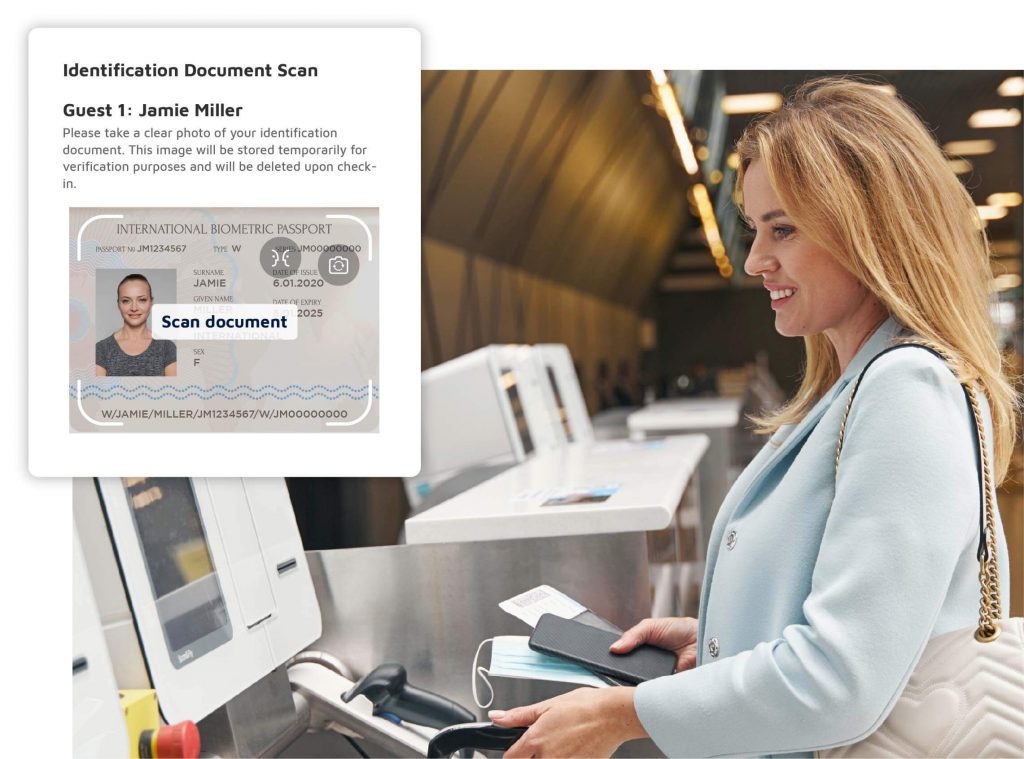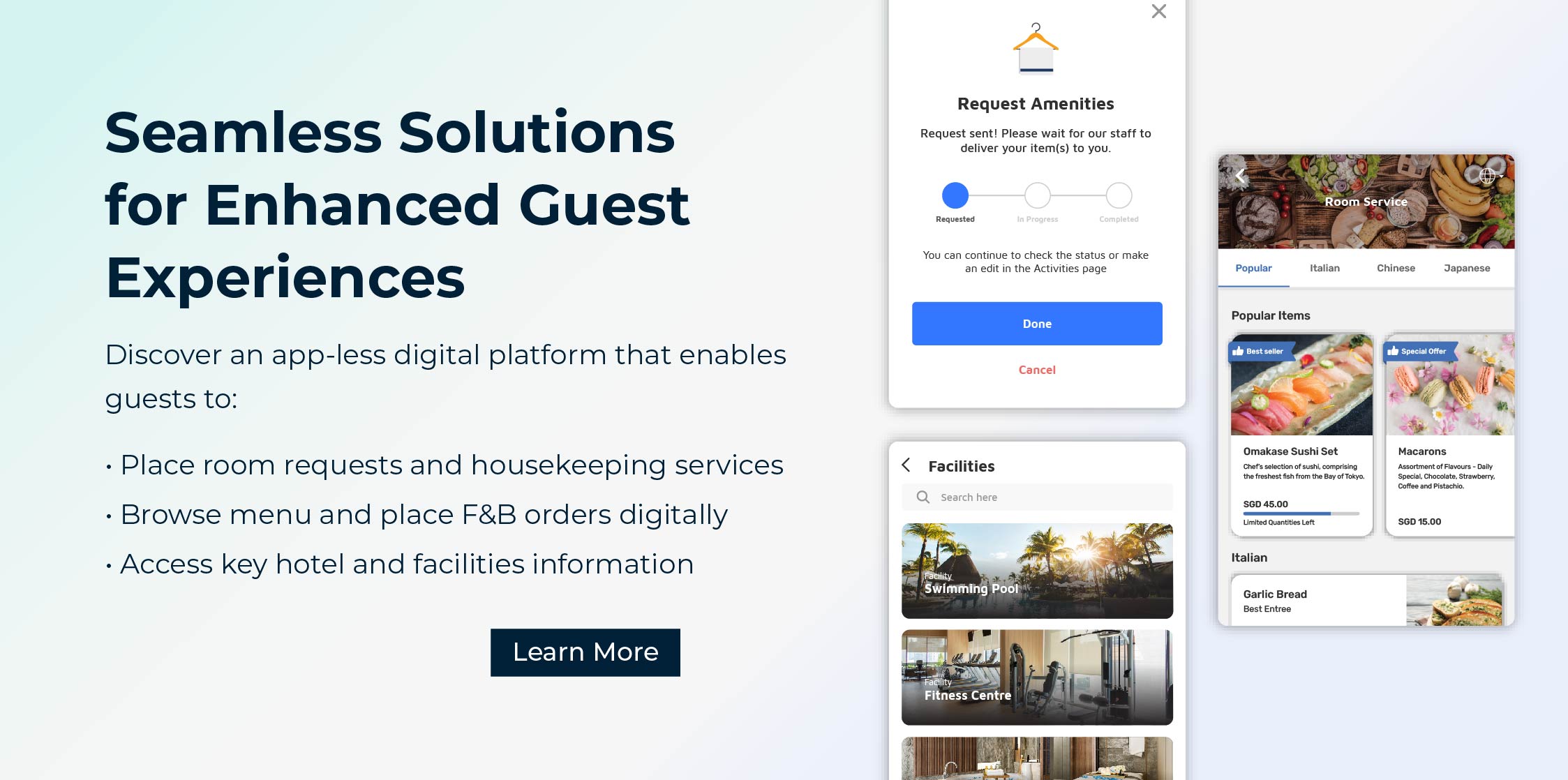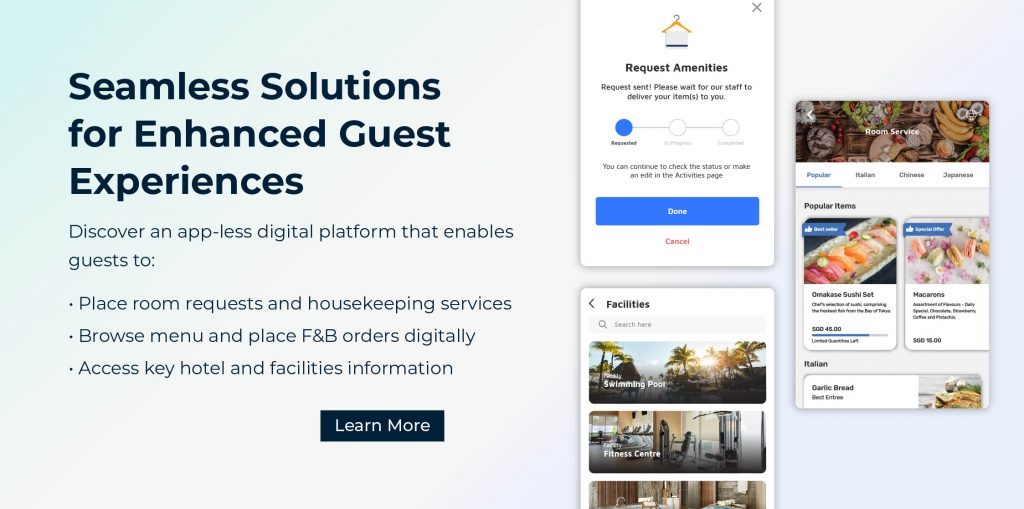
How Can Digital Transformation Drive Efficiency in Hotel Operations?
Introduction
In an era where the beep of a smartphone often signals a room booking, digital transformation has transitioned from a high-tech option to an essential strategy for hotels aiming to thrive.
While many hoteliers recognize the importance of embracing technology, discussions typically skim the surface, focusing on the apparent perks like enhanced guest experiences or streamlined operations.
However, the profound impact of digital transformation extends far deeper, fundamentally redefining the efficiency and productivity of hotel operations at every level.
Digital transformation in hospitality entails the comprehensive integration of advanced technologies across all aspects of hotel management, from the front desk to housekeeping, maintenance, and beyond.
This creates a cohesive, interconnected system that not only boosts operational efficiency but also provides valuable insights for strategic decision-making.
Imagine a scenario where maintenance issues are preemptively addressed before impacting guests, where housekeeping duties are dynamically optimized, and where data-driven strategies maximize both revenue and guest satisfaction.
Beyond the immediate benefits, digital transformation uncovers deeper, often overlooked advantages like predictive analytics for maintenance, automated task management, and robust security measures.
These innovations not only streamline daily operations but also equip hotels to navigate future industry challenges effectively.
In this article, we will explore facets of digital transformation, revealing how these technologies can revolutionize hotel operations.
We will examine key impact areas, offer actionable strategies for integrating technology, and share success stories from the real world, providing hotel managers and hoteliers with practical insights to enhance operational efficiency.
Understanding Digital Transformation in Hospitality
Defining Digital Transformation
Digital transformation in the hotel industry is not just about adopting new technologies; it’s about reimagining existing business processes and models to drive significant improvements in efficiency, customer service, and overall competitiveness.
This transformation involves integrating digital technology into all areas of hotel operations, fundamentally changing how businesses operate and deliver value to guests.
It’s about using technology not as a tool, but as a core strategy to enhance every interaction within the guest journey—from booking to post-stay feedback.
The Current State of Hotel Operations
Traditionally, hotel operations have been heavily reliant on manual processes, with personal touch points defining the guest experience.
While this personalized approach is invaluable, it often comes with inefficiencies that can detract from the guest experience and operational productivity.
Common issues include fragmented communication systems, manual room assignments, and reactive maintenance schedules—all of which can lead to delays and guest dissatisfaction.
In the current landscape, where guest expectations are continually evolving and competition is intensifying, sticking to traditional methods can hinder a hotel’s ability to adapt and thrive.
Guests now expect seamless experiences, where convenience and efficiency are given. They prefer checking in through their mobile device, using digital keys, and interacting with hotel services through intuitive platforms.
This shift in guest behavior is a clear indicator that the digital transformation of hotel operations isn’t just beneficial—it’s imperative.
Moreover, the digital approach helps in gathering and analyzing vast amounts of data, offering insights into guest preferences and operational bottlenecks.
This data-driven strategy enables hotels to not only meet but anticipate guest needs, streamline operations, and ultimately, drive profitability.
By integrating technologies like AI, IoT, and big data analytics, hotels can transform into smart hospitality hubs, where predictive analytics improve maintenance responses, personalized marketing enhances guest loyalty, and resource management becomes more efficient.
The move towards digital is not merely a trend but a strategic pivot to stay relevant and competitive in a rapidly changing industry.
For hoteliers, understanding and implementing digital transformation means not just keeping pace with technological advances but using them to set new benchmarks in hospitality excellence.
In the following sections, we will explore these key areas of impact, demonstrating how integrating technology not only revolutionizes daily operations but also sets the foundation for sustainable, long-term success in the competitive landscape of hospitality.
6 Key Areas of Impact
1. Streamlining Front Desk Operations
In the digital age, the front desk serves as more than just a physical space for check-ins and check-outs; it’s a crucial touchpoint that sets the tone for a guest’s entire stay.
Digital transformation can significantly streamline front desk operations, enhancing both guest satisfaction and operational efficiency.
By implementing digital check-in and check-out systems, hotels can reduce wait times and free up staff to focus on more personalized guest interactions.
Moreover, digital solutions like mobile apps allow guests to manage their stays directly, from room selection to requesting late check-outs, reducing the administrative burden on front desk personnel.
Automation plays a vital role here. Automated systems can handle routine inquiries and bookings, integrate with calendar systems to update room availability in real time, and even manage loyalty program benefits, which ensures guests receive a seamless and personalized service.
The cumulative effect of these improvements is not only a boost in efficiency but also a substantial enhancement in the guest experience.
2. Enhancing Housekeeping Efficiency
Housekeeping is another critical area where digital transformation can drive significant efficiencies.
Traditional housekeeping operations often involve manual coordination and are prone to human error, leading to inefficiencies and guest dissatisfaction.
By introducing automated room assignment tools and real-time status updates accessible via mobile devices, hotels can optimize their housekeeping workflows.
These tools allow for dynamic scheduling, where housekeeping staff are alerted to room cleanings based on real-time check-outs and guest requests, ensuring rooms are always prepared for new arrivals.
Moreover, integrating IoT devices such as sensors can inform housekeeping staff when guests leave their rooms, making cleanings more timely and less intrusive.
This technology not only improves operational efficiency but also enhances the guest experience by ensuring that interactions are as convenient and minimally disruptive as possible.
3. Improving Guest Services
Digital platforms revolutionize how guests interact with hotel services, from dining and spa reservations to requesting extra pillows.
By integrating these services into a unified guest mobile platform, hotels can offer a more seamless and efficient experience.
Guests can make requests or bookings at their convenience, and staff can respond more quickly and effectively due to centralized communication and management systems.
This integration also provides valuable data that can be used to anticipate guest needs and personalize services.
For example, if data shows a high demand for spa services during certain hours, hotels can adjust staffing levels accordingly or send targeted offers to guests to increase satisfaction and revenue.
4. Optimizing Maintenance Management
Effective maintenance is crucial for guest satisfaction and operational efficiency, yet it is often reactive rather than proactive.
Digital transformation introduces predictive maintenance capabilities, where data from various sensors and systems can predict when equipment like HVAC systems or elevators might fail.
This proactive approach minimizes downtime and can significantly reduce emergency repair costs.
Additionally, digital tools can automate maintenance requests, ensuring they are sent directly to the appropriate staff member with all the information needed to resolve the issue efficiently.
This not only speeds up response times but also improves record-keeping, making it easier to track issues and performance over time.
5. Boosting Revenue with Data Analytics
Data analytics is a powerful tool in the arsenal of digital transformation.
By leveraging data, hotels can gain deep insights into guest behavior, preferences, and spending patterns, which can inform a variety of strategic decisions.
For instance, understanding peak booking times and guest preferences can help hotels craft personalized marketing campaigns, optimize room pricing, and even adjust service offerings.
Hotel revenue managers can also use data analytics to improve their revenue management strategies. By analyzing data from various channels, hotels can better forecast demand and adjust pricing dynamically to maximize revenue per available room (RevPAR).
This strategic use of data not only boosts revenue but also enhances competitiveness in the market.
6. Enhancing Security and Compliance
The final area where digital transformation can make a significant impact is in enhancing security and compliance.
Digital systems allow for better control and monitoring of access points throughout the hotel, ensuring guest safety and security.
Furthermore, digital compliance tools can help hotels ensure they are meeting industry standards and regulations by automating compliance checks and record-keeping.
For example, digital tools can manage staff certifications and training records, automate health and safety audits, and even monitor energy usage to ensure environmental compliance.
This not only helps hotels avoid costly fines and legal issues but also builds trust with guests who are increasingly concerned about security and sustainability.
Technology Integration Strategies
Choosing the Right Technologies
Selecting the appropriate technologies for digital transformation is crucial for ensuring that the integration supports and enhances hotel operations effectively.
This decision should not be driven by the pursuit of the latest tech trend, but rather by a clear understanding of the hotel’s specific needs and operational goals.
Factors such as the size of the hotel, the nature of its guest interactions, and existing infrastructure should guide the selection process.
For instance, a boutique hotel focusing on personalized guest experiences might benefit more from CRM (Customer Relationship Management) systems and mobile guest engagement tools, while a large convention hotel might prioritize event management software and large-scale data analytics platforms.
Conducting a detailed needs assessment in consultation with operational managers and IT professionals can ensure that the chosen technologies are well-aligned with the hotel’s strategic objectives.
Training and Adaptation
Once the appropriate technologies have been selected, the next critical step is ensuring that staff are properly trained and comfortable with the new systems.
This process goes beyond simple tutorials; it involves a comprehensive change management strategy to help staff understand the benefits of the new technology and how it will make their jobs easier and more efficient.
Training should be ongoing to accommodate updates in technology and new staff hires. Moreover, creating a tech-friendly culture within the hotel can encourage staff to embrace these changes enthusiastically.
This might involve regular feedback sessions where staff can discuss challenges and successes with the new technology, and share ideas for further improvements.
Case Studies: Success Stories of Digital Transformation
Digital transformation in the hospitality industry is not just theoretical; numerous hotels worldwide have successfully implemented these technologies, reaping significant benefits.
These case studies demonstrate the practical impacts of digital transformation, providing both inspiration and actionable insights for hoteliers considering similar paths.
Case Study 1: Enhancing F&B Efficiency in a Luxury Hotel
A luxury hotel situated in the heart of a bustling Asian capital significantly transformed its Food and Beverage (F&B) operations through strategic technology integration.
The hotel introduced a digital ordering system which automated 92% of all room service orders and reduced phone-based F&B inquiries by 70%.
This upgrade not only streamlined service delivery but also led to a significant increase in room service orders due to an enhanced digital menu that improved guest engagement and order accuracy.
Case Study 2: Streamlining Facility Management in a Premier Mountain Resort
A premier mountain resort known for its exclusive wellness facilities embraced digital solutions to improve the management of its traditional onsen (hot spring) services.
By implementing an online booking system, the resort allowed guests to reserve onsen slots through a digital platform, enhancing the guest experience by reducing wait times and seamlessly integrating with other hotel services.
This initiative automated 64% of their hot spring bookings, optimized facility utilization and significantly boosted guest satisfaction by providing a more streamlined and responsive service.
Conclusion
As we’ve explored throughout this article, digital transformation in the hospitality industry represents a pivotal shift towards more efficient, guest-centric operations.
By integrating advanced digital technologies, hotels can enhance every facet of their operations—from streamlined check-ins and improved housekeeping to sophisticated data analytics for personalized guest interactions.
The success stories highlight the profound impact of these technologies, demonstrating their ability to solve operational challenges.
For hotel managers and hoteliers, the journey towards digital transformation is not just about adopting new technologies but reimagining how their operations can thrive in a digital world.
Embracing this change is essential for staying competitive in an increasingly tech-driven industry, where the quality of guest experiences directly correlates with operational efficiency.
As the industry evolves, the hotels that can seamlessly integrate technology to enhance both guest satisfaction and operational effectiveness will undoubtedly lead the way.

How Can Digital Transformation Drive Efficiency in Hotel Operations?
Introduction
In an era where the beep of a smartphone often signals a room booking, digital transformation has transitioned from a high-tech option to an essential strategy for hotels aiming to thrive.
While many hoteliers recognize the importance of embracing technology, discussions typically skim the surface, focusing on the apparent perks like enhanced guest experiences or streamlined operations.
However, the profound impact of digital transformation extends far deeper, fundamentally redefining the efficiency and productivity of hotel operations at every level.
Digital transformation in hospitality entails the comprehensive integration of advanced technologies across all aspects of hotel management, from the front desk to housekeeping, maintenance, and beyond.
This creates a cohesive, interconnected system that not only boosts operational efficiency but also provides valuable insights for strategic decision-making.
Imagine a scenario where maintenance issues are preemptively addressed before impacting guests, where housekeeping duties are dynamically optimized, and where data-driven strategies maximize both revenue and guest satisfaction.
Beyond the immediate benefits, digital transformation uncovers deeper, often overlooked advantages like predictive analytics for maintenance, automated task management, and robust security measures.
These innovations not only streamline daily operations but also equip hotels to navigate future industry challenges effectively.
In this article, we will explore facets of digital transformation, revealing how these technologies can revolutionize hotel operations.
We will examine key impact areas, offer actionable strategies for integrating technology, and share success stories from the real world, providing hotel managers and hoteliers with practical insights to enhance operational efficiency.
Understanding Digital Transformation in Hospitality
Defining Digital Transformation
Digital transformation in the hotel industry is not just about adopting new technologies; it’s about reimagining existing business processes and models to drive significant improvements in efficiency, customer service, and overall competitiveness.
This transformation involves integrating digital technology into all areas of hotel operations, fundamentally changing how businesses operate and deliver value to guests.
It’s about using technology not as a tool, but as a core strategy to enhance every interaction within the guest journey—from booking to post-stay feedback.
The Current State of Hotel Operations
Traditionally, hotel operations have been heavily reliant on manual processes, with personal touch points defining the guest experience.
While this personalized approach is invaluable, it often comes with inefficiencies that can detract from the guest experience and operational productivity.
Common issues include fragmented communication systems, manual room assignments, and reactive maintenance schedules—all of which can lead to delays and guest dissatisfaction.
In the current landscape, where guest expectations are continually evolving and competition is intensifying, sticking to traditional methods can hinder a hotel’s ability to adapt and thrive.
Guests now expect seamless experiences, where convenience and efficiency are given. They prefer checking in through their mobile device, using digital keys, and interacting with hotel services through intuitive platforms.
This shift in guest behavior is a clear indicator that the digital transformation of hotel operations isn’t just beneficial—it’s imperative.
Moreover, the digital approach helps in gathering and analyzing vast amounts of data, offering insights into guest preferences and operational bottlenecks.
This data-driven strategy enables hotels to not only meet but anticipate guest needs, streamline operations, and ultimately, drive profitability.
By integrating technologies like AI, IoT, and big data analytics, hotels can transform into smart hospitality hubs, where predictive analytics improve maintenance responses, personalized marketing enhances guest loyalty, and resource management becomes more efficient.
The move towards digital is not merely a trend but a strategic pivot to stay relevant and competitive in a rapidly changing industry.
For hoteliers, understanding and implementing digital transformation means not just keeping pace with technological advances but using them to set new benchmarks in hospitality excellence.
In the following sections, we will explore these key areas of impact, demonstrating how integrating technology not only revolutionizes daily operations but also sets the foundation for sustainable, long-term success in the competitive landscape of hospitality.
6 Key Areas of Impact
1. Streamlining Front Desk Operations
In the digital age, the front desk serves as more than just a physical space for check-ins and check-outs; it’s a crucial touchpoint that sets the tone for a guest’s entire stay.
Digital transformation can significantly streamline front desk operations, enhancing both guest satisfaction and operational efficiency.
By implementing digital check-in and check-out systems, hotels can reduce wait times and free up staff to focus on more personalized guest interactions.
Moreover, digital solutions like mobile apps allow guests to manage their stays directly, from room selection to requesting late check-outs, reducing the administrative burden on front desk personnel.
Automation plays a vital role here. Automated systems can handle routine inquiries and bookings, integrate with calendar systems to update room availability in real time, and even manage loyalty program benefits, which ensures guests receive a seamless and personalized service.
The cumulative effect of these improvements is not only a boost in efficiency but also a substantial enhancement in the guest experience.
2. Enhancing Housekeeping Efficiency
Housekeeping is another critical area where digital transformation can drive significant efficiencies.
Traditional housekeeping operations often involve manual coordination and are prone to human error, leading to inefficiencies and guest dissatisfaction.
By introducing automated room assignment tools and real-time status updates accessible via mobile devices, hotels can optimize their housekeeping workflows.
These tools allow for dynamic scheduling, where housekeeping staff are alerted to room cleanings based on real-time check-outs and guest requests, ensuring rooms are always prepared for new arrivals.
Moreover, integrating IoT devices such as sensors can inform housekeeping staff when guests leave their rooms, making cleanings more timely and less intrusive.
This technology not only improves operational efficiency but also enhances the guest experience by ensuring that interactions are as convenient and minimally disruptive as possible.
3. Improving Guest Services
Digital platforms revolutionize how guests interact with hotel services, from dining and spa reservations to requesting extra pillows.
By integrating these services into a unified guest mobile platform, hotels can offer a more seamless and efficient experience.
Guests can make requests or bookings at their convenience, and staff can respond more quickly and effectively due to centralized communication and management systems.
This integration also provides valuable data that can be used to anticipate guest needs and personalize services.
For example, if data shows a high demand for spa services during certain hours, hotels can adjust staffing levels accordingly or send targeted offers to guests to increase satisfaction and revenue.
4. Optimizing Maintenance Management
Effective maintenance is crucial for guest satisfaction and operational efficiency, yet it is often reactive rather than proactive.
Digital transformation introduces predictive maintenance capabilities, where data from various sensors and systems can predict when equipment like HVAC systems or elevators might fail.
This proactive approach minimizes downtime and can significantly reduce emergency repair costs.
Additionally, digital tools can automate maintenance requests, ensuring they are sent directly to the appropriate staff member with all the information needed to resolve the issue efficiently.
This not only speeds up response times but also improves record-keeping, making it easier to track issues and performance over time.
5. Boosting Revenue with Data Analytics
Data analytics is a powerful tool in the arsenal of digital transformation.
By leveraging data, hotels can gain deep insights into guest behavior, preferences, and spending patterns, which can inform a variety of strategic decisions.
For instance, understanding peak booking times and guest preferences can help hotels craft personalized marketing campaigns, optimize room pricing, and even adjust service offerings.
Hotel revenue managers can also use data analytics to improve their revenue management strategies. By analyzing data from various channels, hotels can better forecast demand and adjust pricing dynamically to maximize revenue per available room (RevPAR).
This strategic use of data not only boosts revenue but also enhances competitiveness in the market.
6. Enhancing Security and Compliance
The final area where digital transformation can make a significant impact is in enhancing security and compliance.
Digital systems allow for better control and monitoring of access points throughout the hotel, ensuring guest safety and security.
Furthermore, digital compliance tools can help hotels ensure they are meeting industry standards and regulations by automating compliance checks and record-keeping.
For example, digital tools can manage staff certifications and training records, automate health and safety audits, and even monitor energy usage to ensure environmental compliance.
This not only helps hotels avoid costly fines and legal issues but also builds trust with guests who are increasingly concerned about security and sustainability.
Technology Integration Strategies
Choosing the Right Technologies
Selecting the appropriate technologies for digital transformation is crucial for ensuring that the integration supports and enhances hotel operations effectively.
This decision should not be driven by the pursuit of the latest tech trend, but rather by a clear understanding of the hotel’s specific needs and operational goals.
Factors such as the size of the hotel, the nature of its guest interactions, and existing infrastructure should guide the selection process.
For instance, a boutique hotel focusing on personalized guest experiences might benefit more from CRM (Customer Relationship Management) systems and mobile guest engagement tools, while a large convention hotel might prioritize event management software and large-scale data analytics platforms.
Conducting a detailed needs assessment in consultation with operational managers and IT professionals can ensure that the chosen technologies are well-aligned with the hotel’s strategic objectives.
Training and Adaptation
Once the appropriate technologies have been selected, the next critical step is ensuring that staff are properly trained and comfortable with the new systems.
This process goes beyond simple tutorials; it involves a comprehensive change management strategy to help staff understand the benefits of the new technology and how it will make their jobs easier and more efficient.
Training should be ongoing to accommodate updates in technology and new staff hires. Moreover, creating a tech-friendly culture within the hotel can encourage staff to embrace these changes enthusiastically.
This might involve regular feedback sessions where staff can discuss challenges and successes with the new technology, and share ideas for further improvements.
Case Studies: Success Stories of Digital Transformation
Digital transformation in the hospitality industry is not just theoretical; numerous hotels worldwide have successfully implemented these technologies, reaping significant benefits.
These case studies demonstrate the practical impacts of digital transformation, providing both inspiration and actionable insights for hoteliers considering similar paths.
Case Study 1: Enhancing F&B Efficiency in a Luxury Hotel
A luxury hotel situated in the heart of a bustling Asian capital significantly transformed its Food and Beverage (F&B) operations through strategic technology integration.
The hotel introduced a digital ordering system which automated 92% of all room service orders and reduced phone-based F&B inquiries by 70%.
This upgrade not only streamlined service delivery but also led to a significant increase in room service orders due to an enhanced digital menu that improved guest engagement and order accuracy.
Case Study 2: Streamlining Facility Management in a Premier Mountain Resort
A premier mountain resort known for its exclusive wellness facilities embraced digital solutions to improve the management of its traditional onsen (hot spring) services.
By implementing an online booking system, the resort allowed guests to reserve onsen slots through a digital platform, enhancing the guest experience by reducing wait times and seamlessly integrating with other hotel services.
This initiative automated 64% of their hot spring bookings, optimized facility utilization and significantly boosted guest satisfaction by providing a more streamlined and responsive service.
Conclusion
As we’ve explored throughout this article, digital transformation in the hospitality industry represents a pivotal shift towards more efficient, guest-centric operations.
By integrating advanced digital technologies, hotels can enhance every facet of their operations—from streamlined check-ins and improved housekeeping to sophisticated data analytics for personalized guest interactions.
The success stories highlight the profound impact of these technologies, demonstrating their ability to solve operational challenges.
For hotel managers and hoteliers, the journey towards digital transformation is not just about adopting new technologies but reimagining how their operations can thrive in a digital world.
Embracing this change is essential for staying competitive in an increasingly tech-driven industry, where the quality of guest experiences directly correlates with operational efficiency.
As the industry evolves, the hotels that can seamlessly integrate technology to enhance both guest satisfaction and operational effectiveness will undoubtedly lead the way.







